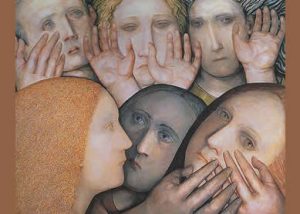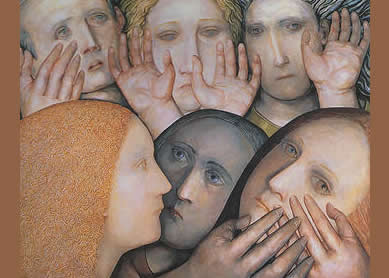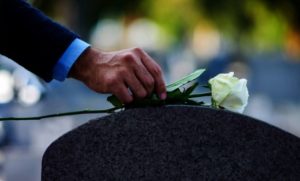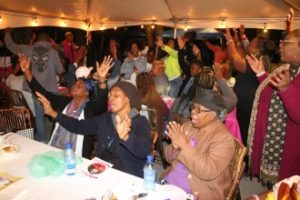Blog Written by Jacinta Marie Neilly
Introduction: Reviving Our Tradition of Lament
Perhaps you or someone you know is facing a tragic loss of life. Sadness, anger, and/or numbness are natural responses to the death of a loved one. While there is no right or wrong way to grieve, it is healthy to release these emotions. In the Bahamas, we have a long tradition of expressing our grief passionately and at length. We used to leave flowers on the deceased’s grave, sing at wakes, wail at funerals, pray, and tell stories. Our grief rituals are changing. We live in an era when the bereaved is expected to bounce back and move on. Suppressing grief is unhealthy, physically and mentally stressful, and it prolongs grief. In response to this unhealthy situation, I propose we reclaim the practice of lament in public and private worship as a resource for the expression of grief and a path for healing.
Lament, a well-established practice in the Bible and Christendom, refers to the acknowledgment and expression of sorrow, grief, or regret. Jesus Christ, the Christian model of lament, in his darkest hour of suffering echoes the Psalmist’s prayer: “My God, my God, why have you forsaken me?”[i] Like Jesus and like us, from antiquity, people have been asking: why (“why me?” “why now?” and “why God?”). While there are no prescribed answers to such probing the one who laments benefits from asking questions and having a listening ear to vent frustration.
Through my ministerial experience and research on grief and loss, I have discovered that grief can be acknowledged and expressed, and healing promoted through lament. The death of a beloved member exemplified this best for my congregation and her quaint community of Cherokee Sound. Esther was so full of life. Within one year of being diagnosed with stomach cancer, she was hospitalized, and intravenously fed liquids for nine months. We suffered in silence as her condition worsened and she passed away. For months, we wrestled with the question: “Lord, why?” “Why so much pain?” “Why not healing?” However, our inner peace and healing came as we struggled together as a community to make sense of Esther’s death, cried out to God and expressed our sorrow publicly. We lamented.
Project: Moving Towards a Solution

Evelyn Williams, Lament 2: Then the Trouble Came, 2004. Oil on canvas, Pembroke College Oxford Art Collection. https://www.bibleodyssey.org/en/tools/image-gallery/l/lament-2
Everyone deserves an opportunity to lament in a supportive environment. Yet, much to our own detriment, many churches and communities, even those with a rich tradition of lament have minimized or neglected such practices. Since the current generation has not been privy to our stories and mourning rituals back then, they have no models and often struggle (or often refuse) to frame or share their own stories. What can be done about this? After sixteen years of ordained ministry in the Bahamas Conference of the Methodist Church (BCMC, I often reflect on this question especially since I pastor in several small towns where the ministry of care extends beyond the walls of the church. The results of my qualitative research affirmed that my colleagues agree that it is up to us to give mourners opportunities to express their grief freely and unreservedly.
[i] See Psalm 22:1a, Matthew 27: 46, NIV
Rev. Carla Culmer: BCMC President and Rev. Philip Stubbs conversing about COVID-19, 25th March 2020
People are hurting but there are very few outlets for expressing pain. The COVID-19 pandemic has only increased our need for pastoral care and for a language to express our grief. My Doctor of Ministry project reintroduced the practice of lament into worship during the pandemic. I developed a three-month series of Pastoral Prayer sessions which took place online during our regular Sunday worship services. Every Sunday a child led the prayer session with a reflection on the question: “How do I cope with COVID-19?” I figured this question would prompt expressions of grief and recovery of hope, which lament facilitates. The children’s honest lamentation awakened our awareness that things are not OK and demanded that we do something. In response, our church established both an online children’s ministry and a center for online schooling. These programs provided space for community children to express their grief and recover hope.
The second part of our Pastoral Prayer session, comprised of special prayers for persons infected and affected by the corona virus. With assurance, all our intercessors prayed the Psalmist’s lament, “God is our refuge and strength, an ever-present help in trouble” (Psalm 46:1, NIV). As renowned author and ecumenical theologian Dietrich Bonhoeffer asserts, “Even in the deepest hopelessness God alone remains the one addressed.”[i] In the future, I will encourage my congregation to pray other lament psalms, such as Psalm 13, 43-56, 61, 88, and 102. Because these psalms not only serves as a pattern for verbalizing sorrow but reminds us that God is in human struggles and that God is approachable, relevant, and accessible to mourners.
[i] Bonhoeffer Dietrich, Eberhard Bethge. Psalms: The Prayer Book of the Bible. Augsburg Books, 1974
The Way Forward: Reclaiming Lament in the Bahamas
No one should go through grief alone. We know that when grieving people receive support, a platform to express inner pain honestly, and the assurance that someone is listening to and cares about their story, and pain, they move towards healing. As church communities we are well positioned to offer that support, love, compassion, and respect. We already know how to foster healthy relationships and safe spaces for dialoguing about hard topics. The Bahamian church also has a long history of cooking food for the one suffering, praying, cleaning their house, storytelling, and helping to organize the funeral. Establishing or re-establishing such a sense of community will require the pastor and congregation to share pastoral responsibilities of caring. We can do this.
All humans need an outlet to express their emotions, especially ones as profound as grief. Ignoring it will not make grief go away. Historically, lament has been one of the most effective means of expressing grief and it is still necessary today. I suggest religious leaders help restore Bahamian practices that facilitate the personal and communal expression of grief by reintroducing lament as a public and private practice, both in worship and in pastoral care. I recommend we begin immediately to re-teach the language of lament, revive caring communities, and provide models and forums that encourage the liberal expression of sorrows.


